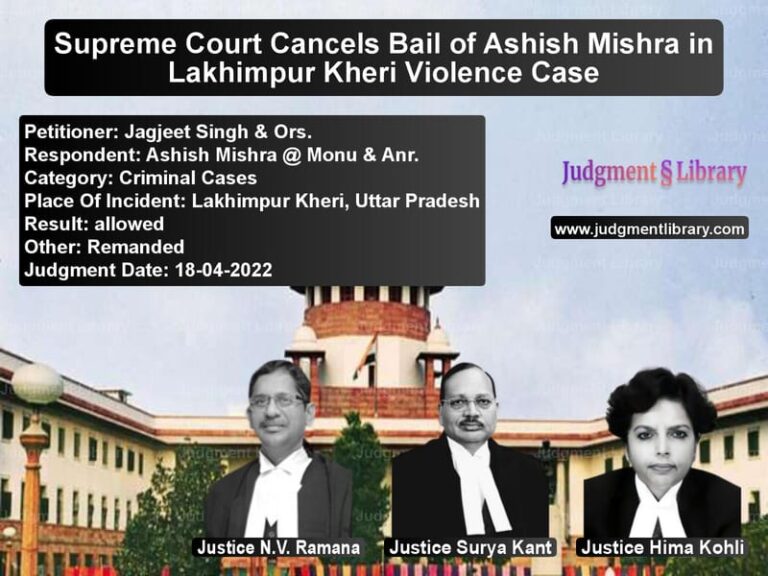Karnataka Teachers Transfer Policy: Supreme Court Upholds Mutual Transfers Under SSA Scheme
In a significant ruling, the Supreme Court of India upheld the validity of mutual transfers of teachers under the Sarva Shiksha Abhiyan (SSA) Scheme, overturning decisions of the Karnataka Administrative Tribunal and the Karnataka High Court. The case, State of Karnataka & Anr. vs. Krishna Kumar & Ors., centered on whether the State Government’s policy on mutual transfers violated the Karnataka Civil Services (Regulation of Transfer of Teachers) Act, 2007.
The Supreme Court ruled that the SSA Scheme is an independent program aimed at broadening educational access, and as such, provisions regarding mutual transfers can be implemented separately from general transfer policies.
Background of the Case
The dispute arose when teachers recruited under the SSA Scheme challenged Clause 13 of the Office Memorandum dated 07.04.2010, which permitted mutual transfers. The Karnataka Administrative Tribunal quashed the provision, ruling that all transfers should be governed by the 2007 Act. The Karnataka High Court upheld this decision, leading the State of Karnataka to appeal before the Supreme Court.
Key aspects of the case:
- The SSA Scheme introduced higher primary schools in rural Karnataka by adding Class 8 to existing primary schools.
- Teachers appointed under SSA were subject to specific terms regarding workload and placement.
- The Office Memorandum allowed mutual transfers of SSA teachers within the same pay scale and subject area.
- The Administrative Tribunal struck down the provision, and the High Court affirmed this decision.
- The State of Karnataka challenged the ruling in the Supreme Court.
Arguments by the Appellant (State of Karnataka)
The State Government put forth the following arguments:
- The SSA Scheme is an independent initiative aimed at improving rural education.
- The 2007 Transfer Act does not explicitly regulate transfers under SSA.
- The mutual transfer provision was voluntary, ensuring that both teachers consent before a transfer is approved.
- The Tribunal and the High Court failed to consider the distinct objectives of the SSA Scheme.
Arguments by the Respondents (Krishna Kumar & Ors.)
The respondents opposed the appeal with the following arguments:
- All government teachers, including those under SSA, should be subject to the 2007 Transfer Act.
- The State Government cannot introduce separate transfer policies without legislative approval.
- Mutual transfers could lead to favoritism and administrative irregularities.
Supreme Court’s Observations and Ruling
The Supreme Court examined the provisions of the 2007 Transfer Act, the SSA Scheme, and the disputed Office Memorandum. The Court ruled in favor of the State of Karnataka, stating:
“The SSA Scheme is an independent scheme, and considering its imperative, certain primary schools were upgraded and styled as higher primary schools. The hybrid category of primary schools was created to make education broad-based in rural areas.”
The Court further observed:
“Even assuming that the provisions of the 2007 Act and rules thereunder are applicable, since there is no provision to the contrary therein, the provision in question providing for mutual transfer could have been carved out by issuing executive instructions.”
The ruling clarified that mutual transfers were voluntary and did not violate any statutory provisions:
- Mutual transfers only applied to teachers in the same pay scale and subject area.
- The transfers required consent from both parties and did not affect salaries or seniority.
- The provision was an administrative measure tailored to the needs of the SSA Scheme.
Final Ruling
The Supreme Court set aside the orders of the Tribunal and the High Court, holding:
- The mutual transfer provision under the Office Memorandum dated 07.04.2010 is valid.
- The Tribunal and the High Court misinterpreted the relationship between the SSA Scheme and the 2007 Transfer Act.
- The appeals filed by the State of Karnataka were allowed, reinstating the transfer policy.
Implications of the Judgment
The ruling has significant implications for education policy and administrative governance:
- Recognition of SSA’s autonomy: The decision clarifies that government programs like SSA can have independent policies.
- Validity of executive orders: The ruling reinforces the authority of executive instructions when no conflicting legislation exists.
- Flexibility in teacher transfers: Mutual transfers allow better allocation of teaching resources without violating employee rights.
- Judicial restraint: The judgment highlights that courts should not interfere with executive decisions unless they are unconstitutional or arbitrary.
The Supreme Court’s ruling in State of Karnataka & Anr. vs. Krishna Kumar & Ors. is a crucial precedent in administrative law, ensuring that education policies remain flexible to serve rural communities effectively.
Petitioner Name: State of Karnataka & Anr..Respondent Name: Krishna Kumar & Ors..Judgment By: Justice Arun Mishra, Justice Navin Sinha.Place Of Incident: Karnataka.Judgment Date: 23-04-2019.
Don’t miss out on the full details! Download the complete judgment in PDF format below and gain valuable insights instantly!
Download Judgment: State of Karnataka & vs Krishna Kumar & Ors. Supreme Court of India Judgment Dated 23-04-2019.pdf
Direct Downlaod Judgment: Direct downlaod this Judgment
See all petitions in Transfers Cases
See all petitions in Recruitment Policies
See all petitions in Judgment by Arun Mishra
See all petitions in Judgment by Navin Sinha
See all petitions in allowed
See all petitions in Quashed
See all petitions in supreme court of India judgments April 2019
See all petitions in 2019 judgments
See all posts in Service Matters Category
See all allowed petitions in Service Matters Category
See all Dismissed petitions in Service Matters Category
See all partially allowed petitions in Service Matters Category







